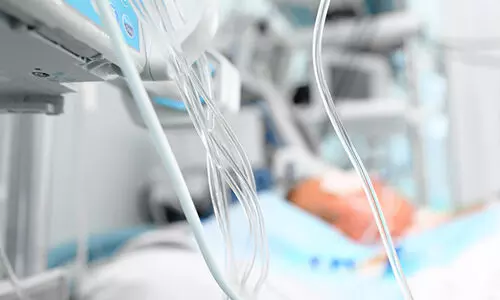- Home
- Medical news & Guidelines
- Anesthesiology
- Cardiology and CTVS
- Critical Care
- Dentistry
- Dermatology
- Diabetes and Endocrinology
- ENT
- Gastroenterology
- Medicine
- Nephrology
- Neurology
- Obstretics-Gynaecology
- Oncology
- Ophthalmology
- Orthopaedics
- Pediatrics-Neonatology
- Psychiatry
- Pulmonology
- Radiology
- Surgery
- Urology
- Laboratory Medicine
- Diet
- Nursing
- Paramedical
- Physiotherapy
- Health news
- Fact Check
- Bone Health Fact Check
- Brain Health Fact Check
- Cancer Related Fact Check
- Child Care Fact Check
- Dental and oral health fact check
- Diabetes and metabolic health fact check
- Diet and Nutrition Fact Check
- Eye and ENT Care Fact Check
- Fitness fact check
- Gut health fact check
- Heart health fact check
- Kidney health fact check
- Medical education fact check
- Men's health fact check
- Respiratory fact check
- Skin and hair care fact check
- Vaccine and Immunization fact check
- Women's health fact check
- AYUSH
- State News
- Andaman and Nicobar Islands
- Andhra Pradesh
- Arunachal Pradesh
- Assam
- Bihar
- Chandigarh
- Chattisgarh
- Dadra and Nagar Haveli
- Daman and Diu
- Delhi
- Goa
- Gujarat
- Haryana
- Himachal Pradesh
- Jammu & Kashmir
- Jharkhand
- Karnataka
- Kerala
- Ladakh
- Lakshadweep
- Madhya Pradesh
- Maharashtra
- Manipur
- Meghalaya
- Mizoram
- Nagaland
- Odisha
- Puducherry
- Punjab
- Rajasthan
- Sikkim
- Tamil Nadu
- Telangana
- Tripura
- Uttar Pradesh
- Uttrakhand
- West Bengal
- Medical Education
- Industry
Early Intervention for physical comorbidity in patients with mental illness reduces premature mortality

Early intervention on various physical health parameters is important to lessen morbidity and premature mortality in severe mental illness patients as per a study published in the journal "The Lancet Psychiatry, 2022."
Past Literature shows that individuals with severe mental illness, have an increased prevalence of chronic physical health problems. The temporal relationship between physical disease acquisition and diagnosis of a severe mental illness is not clear despite the increased rates of physical health problems in people with schizophrenia, bipolar disorder, and other psychotic illnesses. So, researchers from the U.K. conducted a study to determine the cumulative prevalence of 24 chronic physical conditions in people with severe mental illness from 5 years before to 5 years after their diagnosis.
Using the UK Clinical Practice Research Datalink (CPRD), a cohort study was performed on patients aged 18–100 years who were diagnosed with severe mental illness between Jan 1, 2000, and Dec 31, 2018. Patients with severe mental illness were matched with up to four individuals without severe mental illness from the CPRD by sex, 5-year age band, primary care practice, and year of primary care practice registration. Individuals in the matched cohort were assigned an index date equal to the date of severe mental illness diagnosis in patients with severe mental illness to whom they were matched. The cumulative prevalence of 24 physical health conditions, based on the Charlson and Elixhauser comorbidity indices, at 5 years, 3 years, and 1 year before and after severe mental illness diagnosis and at the time of diagnosis was the primary outcome. After adjusting for key variables such as age, sex, and ethnicity, logistic regression was used to compare people with severe mental illness with the matched cohort.
Results:
- 68,789 patients diagnosed with a severe mental illness were matched to 2,74,827 patients without a severe mental illness diagnosis.
- The median age in both cohorts was 40·90 years.
- 1,75,138 (50·97%) people were male, and 1,68,478 (49·03%) were female.
- The majority of patients were of White ethnicity.
- The most prevalent conditions at the time of diagnosis in people with severe mental illness were asthma, hypertension, diabetes, neurological disease, and hypothyroidism.
- At diagnosis, people with schizophrenia had increased odds of five of 24 chronic physical conditions compared with matched controls, and nine of 24 conditions were diagnosed less frequently than in matched controls.
- Individuals with bipolar disorder and other psychoses had increased odds of 15 conditions at diagnosis.
- At 5 years after severe mental illness diagnosis, these numbers had increased to 13 conditions for schizophrenia, 19 for bipolar disorder, and 16 for other psychoses.
Thus, the researchers finally concluded that due to the increased odds of multiple conditions at the time of severe mental illness diagnosis, early intervention in physical health is necessary to reduce morbidity and premature mortality. They also mentioned that relative to patients with other severe mental illness subtypes some physical conditions might be under-recorded in patients with schizophrenia.
To read the full article, click here: https://doi.org/10.1016/S2215-0366(22)00225-5
Launders N, Kirsh L, Osborn DPJ, Hayes JF. The temporal relationship between severe mental illness diagnosis and chronic physical comorbidity: a UK primary care cohort study of disease burden over 10 years. The Lancet Psychiatry. Published online July 2022.
BDS, MDS
Dr.Niharika Harsha B (BDS,MDS) completed her BDS from Govt Dental College, Hyderabad and MDS from Dr.NTR University of health sciences(Now Kaloji Rao University). She has 4 years of private dental practice and worked for 2 years as Consultant Oral Radiologist at a Dental Imaging Centre in Hyderabad. She worked as Research Assistant and scientific writer in the development of Oral Anti cancer screening device with her seniors. She has a deep intriguing wish in writing highly engaging, captivating and informative medical content for a wider audience. She can be contacted at editorial@medicaldialogues.in.
Dr Kamal Kant Kohli-MBBS, DTCD- a chest specialist with more than 30 years of practice and a flair for writing clinical articles, Dr Kamal Kant Kohli joined Medical Dialogues as a Chief Editor of Medical News. Besides writing articles, as an editor, he proofreads and verifies all the medical content published on Medical Dialogues including those coming from journals, studies,medical conferences,guidelines etc. Email: drkohli@medicaldialogues.in. Contact no. 011-43720751




